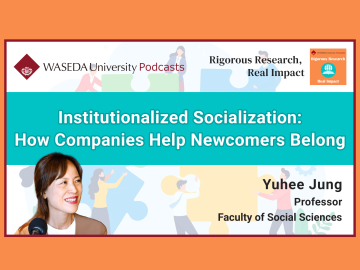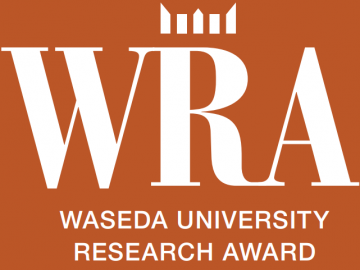Waseda University established the Waseda Research Award in 2014 to promote innovative research at the university and disseminate its results around the world. The award honors scholars spearheading Large Research Projects, as well as emerging researchers whose work has had significant impact abroad. The award has two categories: Large-Scale Research Project and High-Impact Publication. Recipients of the award receive a certificate and a prize of 500,000 yen for the Large Research Project catgory, and 300,000 yen for the High-Impact Publication category.
Below, we proudly present the recipients of the 2024 Waseda Research Award.
Recipients of the 2024 Waseda Research Award
Large Research Project Category
*in alphabetical order
- Takao AOKI
Large-scale quantum hardware based on nanofiber cavity QED - Kei YURA
Support of life science studies by all-in-one single cell/micro tissue multi-omics analysis
High-Impact Publication Category
*in alphabetical order
Yoshihiko ARAO
Dr. Yoshihiko Arao has achieved remarkable success in his research on the design, development, and evaluation of nanomaterials, which are garnering attention as reinforcing agents and functional materials in composite materials. He focuses on layered materials such as graphene, which offers high strength and thermal conductivity, as well as boron nitride, employing proprietary technologies to develop energy-efficient mass production and resource recycling processes. His research is expected to contribute to solutions for future social challenges, such as carbon neutrality and attaining a circular economy. His research findings have been published in numerous prestigious international journals and have garnered many citations, demonstrating their high international impact and value. He is also advancing collaborative research with overseas researchers, and we anticipate the development of an international network centered around him. For these reasons, he is a worthy recipient of the WASEDA RESEARCH AWARD(High-Impact Publication)
Shungo SUZUKI
Dr. Shungo Suzuki specializes in second language speaking research, with a particular focus on fluency, and his research demonstrates exceptional innovation, creativity, and originality. He has expanded his research to include reading, listening, writing, and vocabulary, earning high international acclaim for his work. Dr. Suzuki has not only published numerous papers in peer-reviewed international journals but has also co-authored papers with researchers from the UK, Austria, and Australia, leveraging international networks to advance his research activities. His papers published in peer-reviewed international journals have achieved remarkably high citation and download counts, indicating notable academic impact. Furthermore, InteLLA, a conversational agent system for assessing English speaking ability that Dr. Suzuki developed as principal investigator, shows great promise for social impact in foreign language education.
Keita TAKENOUCHI
A devoted and innovative archaeologist, Keita Takenouchi carries forth the strong tradition of Egyptology at Waseda University. By focusing on an archaeological object including fine pottery and stone vessels found in ancient mortuary sites, Takenouchi advances the field of Egyptology in many ways. His careful effort has yielded not only scholarly interpretations of material culture, but a richer understanding of the broader socio-economic context of early Egypt as well. The rigorous scientific analysis he employs in his research, including the use of advanced X-ray CT systems, requires multi-faceted technical expertise. Nonetheless, Takenouchi is able to present his findings in a clear and engaging manner. That he has done so in the top international journals of his field, vetted by its leading scholars, makes his achievement all the more impressive. As befitting the Waseda Research Award for High-Impact Publication, Takenouchi has produced some of his best works in English and shared his findings internationally. Thus Takenouchi has made genuine additions to three fields – Egyptology, archaeology, and archaeological science. In the words of one prominent peer, “It is rare to see all of these covered well by a single researcher.” Takenouchi has managed to do just that.
Xichao ZHANG
Dr. Xichao Zhang works on the theoretical and computational research of topological spin textures, including magnetic skyrmions, with a focus on the elucidation of new phenomena and the exploration of functionality. In particular, he has made new theoretical predictions regarding the dynamics and strong current-induced effects of skyrmions in nanostructures. He has published 67 peer-reviewed academic papers over the past five years, including 10 first-author papers, demonstrating his outstanding research output. These publications show his ability to conduct research from multiple perspectives while leveraging his strengths. Due to the high research output and multifaceted approach, he has been ranked among the Stanford University’s World’s Top 2% Scientists from 2020 to 2023. Skyrmions, which are topologically non-trivial spin textures in magnets, are being studied worldwide and are drawing attention from the perspective of nonvolatile magnetic memory technologies. Dr. Zhang’s research results, which focus on the dynamic behaviors of skyrmions in various systems, are expected to contribute to future spintronic and magnetic applications.
Masahito HOSOKAWA
Dr. Masahito Hosokawa has achieved pioneering and innovative results in the field of single-cell analysis of microorganisms, particularly bacteria. He has established a unique single-cell genome analysis method utilizing microscale gel beads, whole-genome amplification reactions, and microfluidic technology. This method excels in its ability to analyze individual bacterial genomes within communities without cultivation, and when combined with conventional metagenome analysis, can reveal the roles of specific bacteria within bacterial communities. These achievements have been published in Microbiome and numerous other high-impact international journals and have received high international acclaim. Furthermore, in 2018, he founded bitBiome Inc., a Waseda University startup company, through which he conducts research activities utilizing international networks and returns the results to society. His research is expected to contribute not only to the development of the bioeconomy and the establishment of a sustainable society but also to human health and longevity. His work’s academic and social impact can thus be evaluated as extremely high.








